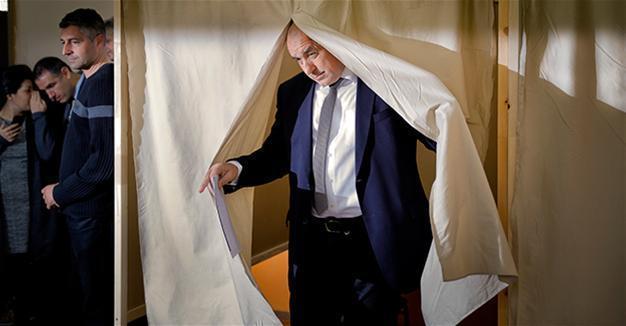Bulgaria’s veteran politician Borisov seeks third time lucky
SOFIA

AP photo
Bulgaria’s veteran political bruiser Boyko Borisov has begun efforts to form a lasting government and become prime minister for the third time following his election victory.His pro-EU center-right GERB party won the snap election in the European Union’s poorest country with 32.6 percent of the ballot.
Official results showed that GERB will hold 96 of 240 parliamentary seats, 12 more than in the outgoing administration.
The burly Borisov, a former firefighter and bodyguard, saw off a stiff challenge from the Socialist Party (BSP) - seen as closer to Moscow - which garnered 27 percent and more than doubled its MPs to 79.
In the campaign, Borisov ruled out a tie-up with the centrist Movement for Rights and Freedoms (MDL) party, representing Bulgaria’s Turkish minority, which came third or fourth with around 9.5 percent. The nationalist alliance of the United Patriots won 9.2 percent, according to the latest count.
Last year, a group split off from the MDL and formed a new party, DOST, which only obtained 2.9 percent and will not be represented in the 240-seat parliament. Turkish officials, including Turkey’s ambassador to Bulgaria, had voiced Ankara’s support for DOST, triggering a reaction from Bulgaria.
The election came as Bulgarian nationalists blocked the three main crossing points with Turkey to prevent thousands of Turks with Bulgarian passports coming to vote in the election. Many groups said after the election that they were not able to vote.
Bulgaria is home to a 700,000-strong Muslim minority, most of them Turks, while at least 200,000 ethnic Turks with Bulgarian passports live in Turkey.
“I hope we can ensure the rapid formation of a government that responds to the wishes of the people and to the grave international situation,” Borisov said late on March 26.
But whether the 57-year-old can form a government - one that stays the course and is effective, unlike his previous two attempts - remains to be seen.
Bulgaria, where the average monthly salary is just 500 euros ($540) and where corruption is rife even after 10 years in the EU, has now seen three elections in four years.
In the first half of next year, Bulgaria will hold the rotating presidency of the EU in the midst of Britain’s negotiations with Brussels on the terms of its exit from the bloc.
Borisov, once a bodyguard for Bulgaria’s last communist leader and its ex-king, has long dominated national politics, serving as premier from 2009 to 2013 and again from 2014 to 2017.
But both times Borisov quit early, first in 2013 after mass protests and then last November after his candidate for the presidency was beaten by an air force commander backed by the BSP.
His reform efforts, in particular in meeting Brussels’ demands to tackle corruption and organized crime, failed to get off the ground both times.
A victory for the Socialists would have raised the prospect of the NATO member of 7.4 million people in southeastern Europe tilting closer to Moscow.
Russia, which has long had close cultural and economic ties with Bulgaria, has recently been accused of seeking to expand its influence in other Balkan countries.
PSB leader Kornelia Ninova had said she was not content with Bulgaria being a “second-class member” of the EU and that she would veto an extension of sanctions imposed by Brussels on Moscow.
But Borisov also said during the campaign that he wanted more “pragmatic” ties with Russia and to revive contentious joint projects.
He also successfully portrayed himself as being able to preserve Bulgaria’s status as an “island of stability” in an unstable Balkans and amid tensions with neighboring Turkey.
“Borisov had the wonderful idea of being reassuring, of adopting the role of unifier, of conciliator,” Agence France-Presse quoted political analyst Haralan Alexandrov as saying.
The scourge of graft loomed over the poll, with prosecutors launching multiple electoral fraud probes and television channels alleging sales of votes for as little as 15 euros.
Voter apathy and disillusionment with the main parties were also widespread.
“The big parties are totally disconnected from the reality of what is going on in Bulgaria and that is outright irresponsible,” said IT worker Alexander Naydenov, 35.
















